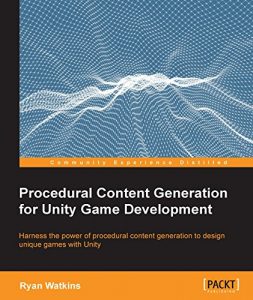Key Features
- Learn the basics of PCG development
- Develop a 2D game from start to finish
- Explore all the different ways PCG can be applied in games
Book Description
Procedural Content Generation is a process by which game content is developed using computer algorithms, rather than through the manual efforts of game developers. This book teaches readers how to develop algorithms for procedural generation that they can use in their own games. These concepts are put into practice using C# and Unity is used as the game development engine.
This book provides the fundamentals of learning and continued learning using PCG. You'll discover the theory of PCG and the mighty Pseudo Random Number Generator. Random numbers such as die rolls and card drafting provide the chance factor that makes games fun and supplies spontaneity. This book also takes you through the full development of a 2D game.
Starting with level generation, you'll learn how PCG can make the game environment for you. You'll move into item generation and learn the different techniques to procedurally create game items. Thereafter, you'll be guided through the more abstract PCG areas such as scaling difficulty to the player and even generating music! The book helps you set up systems within your games where algorithms create computationally generated levels, art assets, quests, stories, characters, and weapons; these can substantially reduce the burden of manually creating every aspect of the game.
Finally, you'll get to try out your new PCG skills on 3D terrain generation.
What you will learn
- Understand the theory of Procedural Content Generation
- Learn the uses of Pseudo Random Numbers
- Create reusable algorithm designs for PCG
- Evaluate the data structures for PCG
- Develop smaller games with larger amounts of content
- Generate content instead of spending time designing every minute detail
- Learn when and how to add PCG to your game
- Learn the fundamental techniques of PCG
About the Author
Ryan Watkins was digitized and absorbed into his computer at an early age. In the digital realm, he learned the importance of video games and the balance they brought to the ecosystem of computing. Video games strive to always push the boundaries of what we know to be true while being a super-charged source of fun. Ryan formed friendships with many of the video games he encountered on his digital journeys, and in return, they shared the secrets of their creation with him. He has since returned to the physical world to share those secrets with the rest of us.
Table of Contents
- Pseudo Random Numbers
- Roguelike Games
- Generating an Endless World
- Generating Random Dungeons
- Randomized Items
- Generating Modular Weapons
- Adaptive Difficulty
- Generating Music
- Generating a 3D Planet
- Generating the Future






